Softr vs. Devless: Build Your Ideas for App Development
Are you a business owner with an idea for app development? Developing the right app for your business can be critical in today's highly competitive market. Still, onboarding developers and learning complex coding languages can be overwhelming. Not to worry: tools Softr and Devless offer easy-to-use platforms designed with non-technical users in mind! In this article, we'll explore these effective app development tools, analyze their pros & cons, and see which suits you and your business needs best. So jump on board – it's time to get started with your app idea!

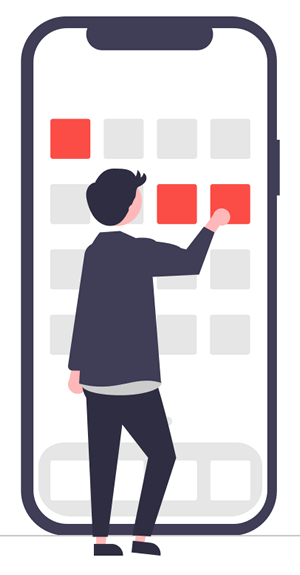
#1. Setup & Onboarding: No Database with Devless
Easy app setup is essential for users to get a quick win right out of the gate. Fortunately, both platforms offer a smooth onboarding process that even beginners can easily understand. From a user-friendly interface that guides you through the process to fast loading times, so you don't have to wait around, you will get off to a great start.
Devless's setup lets you stand up an application in just two steps and provides instructions. You can create an example app with a single click or name your app and assign it a URL. That's it! Your app is official. Once the confetti drops, you can add content to your app or customize it — no backend database is needed. Thanks to the speed of this setup process, you'll be able to launch your very own application in record time.
The Softr setup is fast too. You can start from scratch or choose a template. However, there is one roadblock you may hit. During this process, they ask for an Airtable API Key to integrate with a database. If you don't have an Airtable database, you can skip this step and complete it later. Just know that Softr is only a front end to your data structure that lives in Airtable.
Between these two, knowing your business needs and the features you want to incorporate into your app will be essential. The main difference is that Devless is a quicker setup with fewer questions and steps. In addition, you can create apps without a database, saving time and headaches as you develop. With Softr, a database is a requirement. It would be one more thing you'd have to create, connect, and manage if you don't already.
#2. Ease of Use: Intuitive User Interfaces for Beginners
If technology overwhelms you, the drag-and-drop or form-based editors of today's platforms provide much-needed relief. But, even though both usually offer good experiences, one is much easier to use.
Drag-and-drop editors like Softr allow users to move elements onto the page as you build your app. Although this editor often provides more customization, it has drawbacks. The app development process takes considerably longer — for example, designing and programming functionality into your app (more on that in a bit). In addition, you can expect multiple menus to become familiar with and a steep learning curve that will slow your progress.
On the other hand, form-based editors like Devless intentionally offer a quicker, more intuitive interface but with a bit less customization. You can expect a single menu and familiar field types (dropdowns, text boxes, color pickers) with clearly defined options and next steps. As a result, it's efficient and easy for anyone to learn without research.
Ultimately, both editors are ideal for beginners. The better depends on the level of customization you seek, the speed at which you wish to complete your project, and the amount of time and patience you have for learning something new. Overall, Devless will get you to the finish line faster yet give you plenty of customization for a branded, beautiful app.

#3. Designing: Are You a Creative or Do You Want It Done?
Both builders do some heavy lifting for you when it comes to design. With automatic responsiveness and straightforward branding capabilities, plus UI best practices built right in — your apps will deliver that top-notch user experience with minimal effort on your part. Now let's dive into how these two choices differ regarding the app design process.
Softr's drag-and-drop UI will give you a higher level of customization with pre-built blocks for which you can configure the style of any element. While they make it easy, the concern would be the time it takes and one's skill set. The farther you stray from the original design of their templates, the more you risk compromising the good experience Softr has already designed for the end user.
Be aware that it's easy to get carried away with trying out all the bells and whistles. Those shiny objects can quickly lead you down a path of regression, especially if you're a perfectionist. Also, some new developers need to realize it takes even more time to program the functionality of all the 'fancy' but unnecessary additions made.
On the other hand, Devless prevents overwhelm and keeps new developers hyper-focused. Hence, users stand the best chance of completing their app. Designing in Devless consists of adding and organizing content and making simple selections to display it. Then, the platform automatically takes care of the rest. Their done-for-you design includes sign-up pages, login pages, content pages, menus, breadcrumbs, loading spinners, and much more. Now that's fast development!
Although fast, Devless is flexible too! For example, you can customize where your resources display, layouts, visibility, colors, icons, images, etc. But the best part about Devless, and the most significant difference from Softer, is that none of this requires complicated programming for any element.
#4. Adding Functionality: No Complex Programming with Devless
Once you've completed your design in Softr, it's time to program the functionality so the end users can view the correct content and interact with your app as intended. Not only does it take much time, but also careful consideration and precision, as even slight mistakes can cause a feature not to function correctly. To start, this is where you'll connect a backend, an Airtable database, that will feed your app data and store it.
As you program each element in Softr, you'll choose your data source and its table, map the fields to display and add actions. It also allows you to sort, apply conditional filters, layer permissions, and many other things. You should program with relative ease if you're willing to spend time and effort learning the basics of their coding concept.
Otherwise, if your app doesn't need a database, then Devless is the best option. Since content is uploaded directly into Devless Admin, creating a database is unnecessary. Simple settings and plugins will tell your app precisely what to do with your content without all the fuss associated with an Airtable backend.
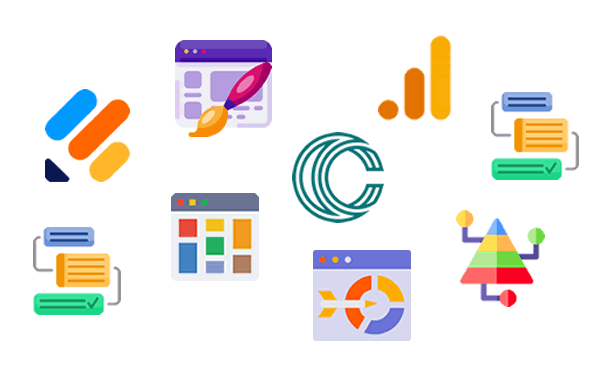
#5. Add-ons: Easy Integrations with Leading Tools
Add-ons easily connect the best leading industry tools into one streamlined platform, your app! In addition, add-ons add functionality and features to an app, such as new tools, integrations, or customizations. As a result, add-ons make apps more versatile and provide valuable insights, which improve apps and make them more effective.
Devless and Softer make it easy for non-technical users to quickly link up popular applications such as Google Analytics, UserWay, Jotform, and others. First, look at the integrations available and see which platform offers the best for your business. Then, for either builder, you must copy the API Key or Site ID from each third-party service and paste it into the platform you're using. From there, it's like magic.
#6. Publishing Native Apps: Only Devless Lists in App Stores
Although publishing your web app is done at the click of a button with these no-code platforms, you encounter limitations with Softr. Softr only allows you to build portals, websites, and web apps. So, if you desire native apps listed in the popular app stores, it's not an option. Devless, however, gives you a web app, an Android app, and an iOS app with one single build.
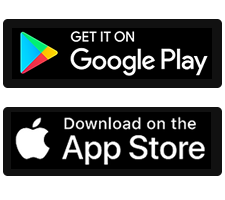
#7. App Analytics: Optimize Performance and Drive Growth
These app builders provide custom analytics dashboards that give business owners great insights. Identify trends in user behavior, track key metrics such as activity, active users, and more. Anyone can quickly hook up to Google Analytics or rely on your app's custom analytics dashboard. The difference is that Softr lets you build your dashboard with their analytics template, and Devless is already tracking from the moment you sign up. So enjoy Devless's beautiful visuals like heatmaps and relax knowing you don't have to lift a finger.
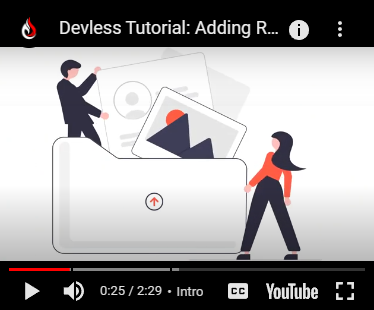
#8. Tech Support: Get Outstanding Service
Even though no-code app builders are user-friendly, some folks may still require tech support for various reasons. These platforms offer responsive and reliable help if you need assistance with complex features, customizations, integration, or troubleshooting. They even welcome feature requests!
Users in a pinch can contact support via email and use their websites' Help Centers to access instructional videos and documentation. And since Softr is a bit more complex, they also provide additional workshops, community forums, chat, and experts for hire.
If you want a personalized demo session, Devless offers next-level service for free by scheduling a demo from their homepage. Then, a team member will demonstrate Devless and show you how Devless can work for your business. Devless is 100% committed to ensuring your success, and there's no catch.
#9. Free Plans: Get a Feel for the Platforms
Devless and Softr “Free Plans” are generally more limited in features and functionality than paid plans. However, they still provide an excellent introduction to the app builder's capabilities and allow users to understand how the platform works. Therefore, it's the most helpful way to decide if the app builder is right and worth investing in a paid plan.
For example, free plans may limit the number of features or users accessing the app. They may also include the platforms' branding, which may only be ideal for personal apps. Regardless, it's a cost-effective way to experiment and gain experience.
#10. Paid Plans: See How They Stack Up
Paid plans for business apps can be desirable because they offer more: advanced features and functionalities, better scalability, customization options, premium support, white labeling, and sometimes monetization options. These features can benefit businesses that require a robust and customizable app to support their operations and goals. Here, we compare the “Business Plans” of Softr and Devless.
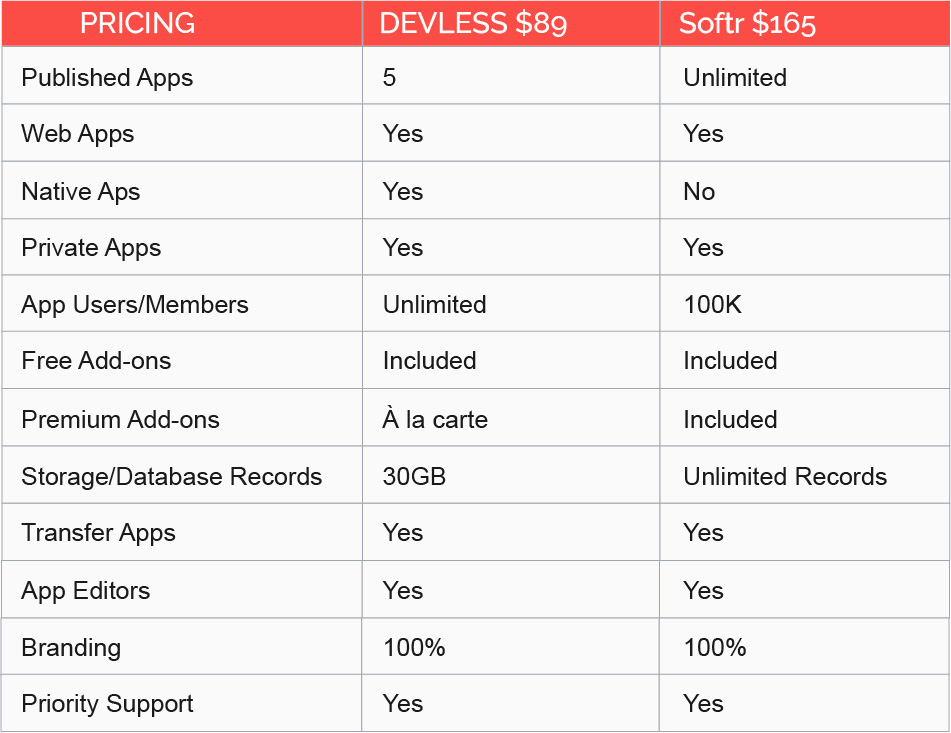
Conclusion
Softr and Devless are fantastic platforms to carry out your ideas for app development. However, Devless is the best choice if you prefer a fast, straightforward development process. Moreover, since you don't need to connect a backend database, spend weeks on design, or program functionality, it is very suitable for beginners. So join today and start building the app that will grow your business!
